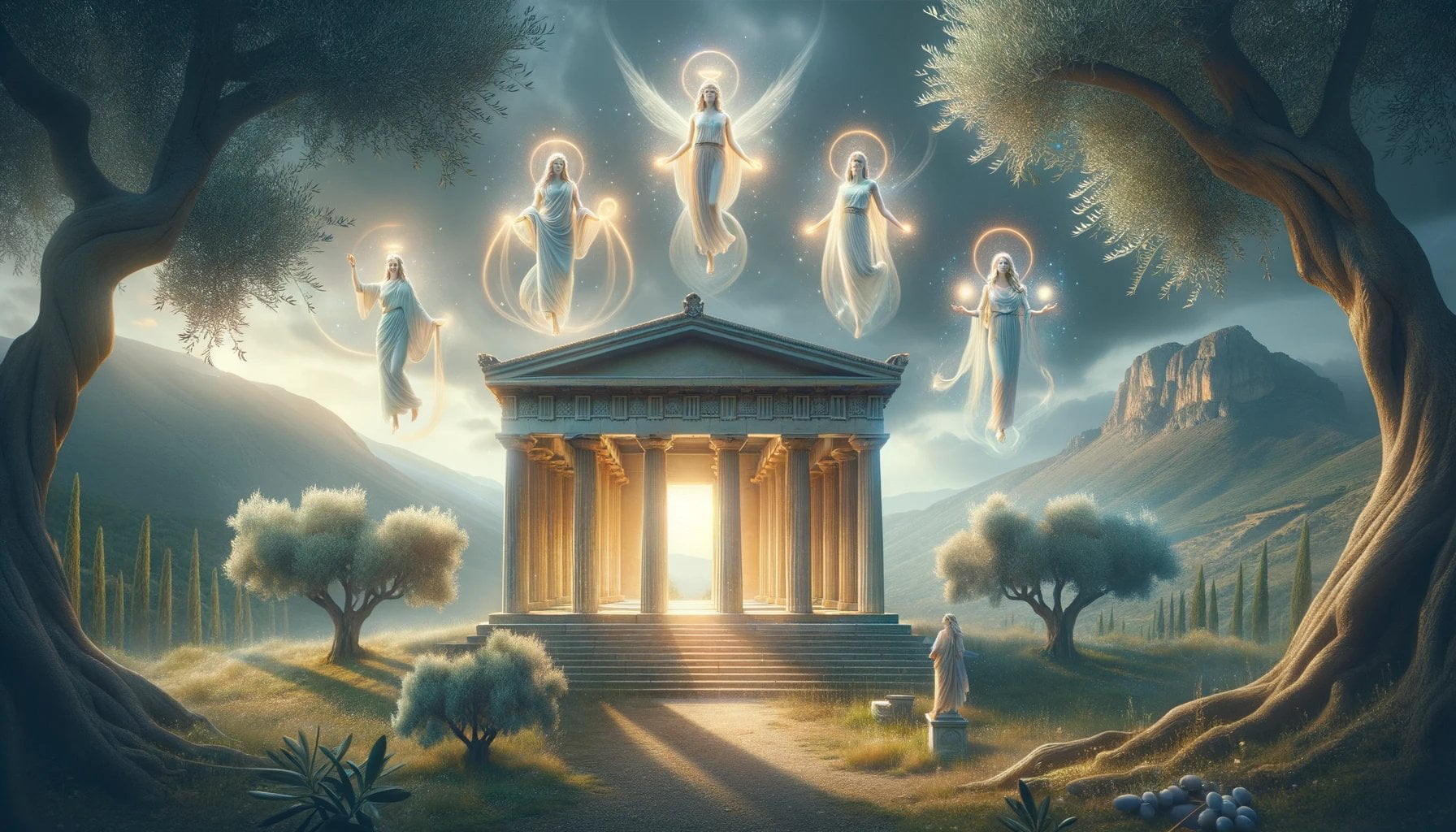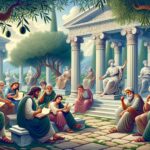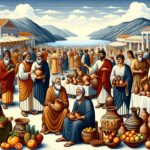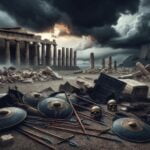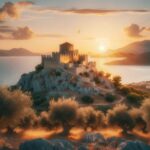Unveiling the Gods and Heroes of Ancient Greece: Mythology, History, and Literary Analysis takes readers on a captivating journey through the realm of Greek mythology. Delving into the rich tapestry of ancient Greek culture, this article explores the awe-inspiring gods and indomitable heroes who have fascinated generations. Through meticulous research and expert storytelling, we unravel the intricate hierarchy of the pantheon and shed light on the timeless tales of valor and tragedy associated with these legendary figures. Join us as we delve into the mystical world of gods and heroes, where myth, history, and literary analysis intertwine to create an immersive experience like no other.
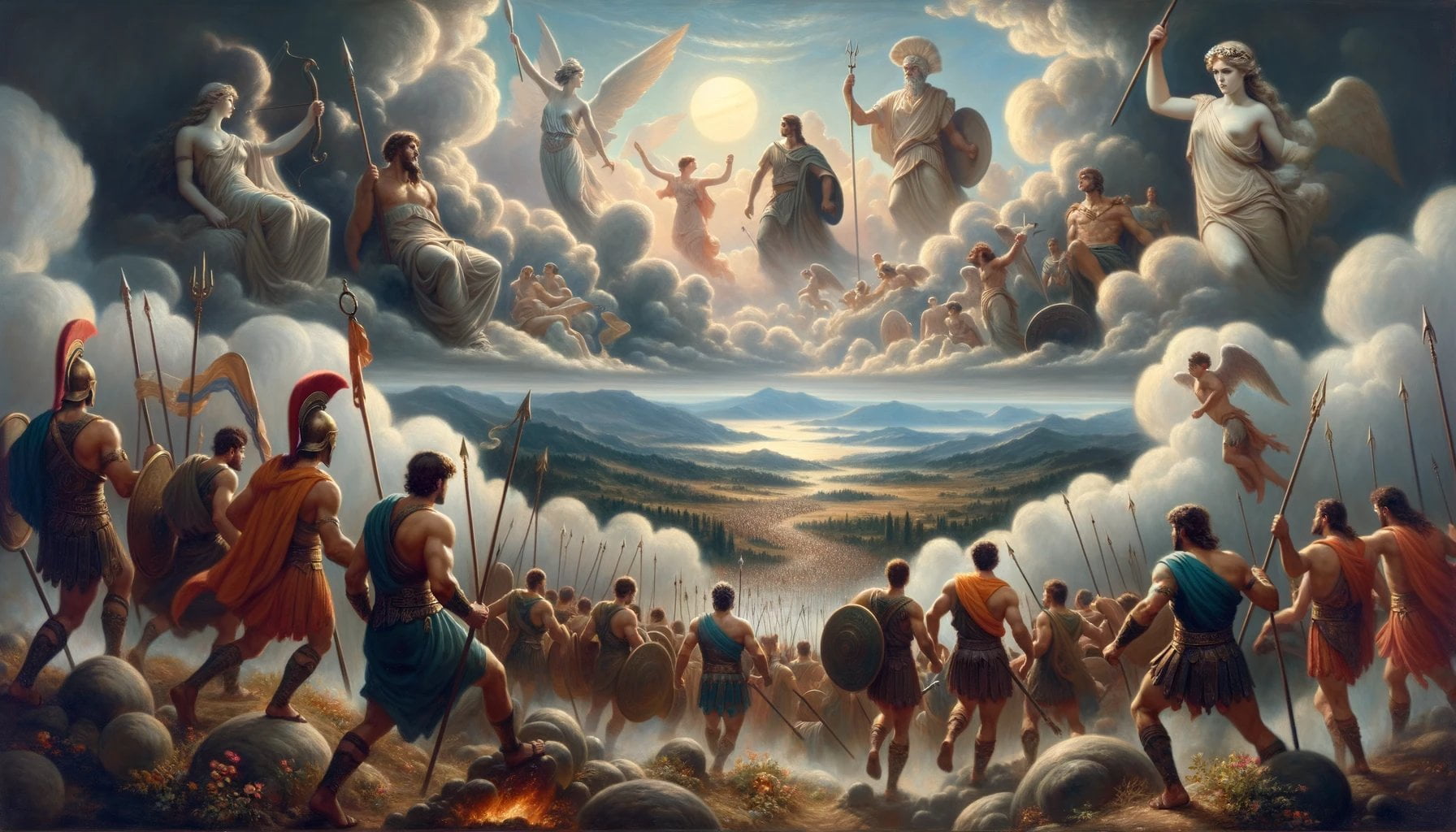
Key Takeaways:
- Greek mythology consists of 12 major gods and heroes, including Zeus, Poseidon, Hades, Hestia, Hera, Ares, Athena, Apollo, Aphrodite, Hermes, Artemis, and Hephaestus.
- Zeus is the chief god, Poseidon is the god of the sea, and Hades is the god of the underworld.
- Each god and goddess has a specific domain and role, such as Hestia being the goddess of the hearth and Hera being the protector of married women.
- Greek mythology plays a significant role in art and culture, with gods and goddesses often depicted in statues and temples, and myths and legends portrayed on coins and vessels.
- For more information, websites like pantheon.org and greekgodsandgoddesses.net provide further details on Greek mythology.
Gods and Heroes of Ancient Greece
When you hear the term “Gods and Heroes of Ancient Greece,” what comes to mind? Perhaps images of mighty deities and courageous warriors flood your imagination. Greek mythology is a treasure trove of captivating tales filled with gods and heroes who have shaped our understanding of ancient civilizations. In this article, we will embark on a fascinating journey to explore the myths, history, and literary analysis surrounding these awe-inspiring figures.
The Divine Hierarchy: Getting to Know the Gods
In the realm of Greek mythology, the gods reigned supreme in their majestic splendor. At the pinnacle of the divine hierarchy stood Zeus, the chief god who wielded thunderbolts and controlled the heavens. Poseidon, the god of the sea, claimed dominion over the vast oceans and commanded the waves. Meanwhile, Hades, the enigmatic god of the underworld, ruled over the realm of the dead.
Each deity possessed unique attributes and had their own distinct role. Hestia, the goddess of the hearth, ensured the warmth and safety of homes. Hera, Zeus’ wife and protector of married women, safeguarded the institution of marriage. Ares, the god of war, reveled in the chaos and carnage of battle. Athena, on the other hand, embodied wisdom and strategic prowess, making her the goddess of battle and wisdom.
From Apollo to Hephaestus: The Heroes Take Center Stage
The pantheon of gods was complemented by an assortment of extraordinary heroes who became legends in their own right. Among these heroes, we encounter figures such as Apollo, the radiant sun-god and patron of music and poetry. Aphrodite, the goddess of beauty and love, held an irresistible allure that captivated both gods and mortals alike.
Hermes, the whimsical messenger of the gods, possessed fleet-footed agility and guided souls to the realm of the dead. Artemis, the goddess of the hunt, roamed the wild with her bow and arrow, protecting both humans and wildlife. And then there was Hephaestus, the lame god of fire and crafts, whose indomitable spirit triumphed over physical disabilities as he forged magnificent creations.
Unveiling the Myths: Legends That Transcend Time
Greek mythology seeps into every aspect of our culture, from ancient sculptures to modern literature and even popular films. The tales of these gods and heroes are woven into the very fabric of our collective imagination. For instance, the trials of Zeus and his encounters with mortals captivated the ancient Greeks and continue to fascinate readers today.
These mythological stories served as a source of inspiration for various art forms. Statues and temples were dedicated to the gods and goddesses, immortalizing their grandeur. Coins and other artifacts were embellished with mythological scenes, bringing the tales to life. The legacy of Greek mythology lives on through these artistic expressions, reassuring us that the gods and heroes are not mere figments of the past but enduring symbols of a powerful and intricate belief system.
Embracing the Ancient Pantheon
As we unravel the captivating world of gods and heroes of ancient Greece, we cannot help but marvel at their profound impact on human history and culture. Greek mythology offers us an opportunity to explore the depths of human emotions, unravel morality, and ponder the mysteries of the universe. Through the artistry of storytelling, we can immerse ourselves in this enchanting realm and embrace the gods and heroes as if they were our timeless companions.
So, are you ready to embark on this mythical odyssey? Let your imagination soar as we delve into the pantheon of gods and the extraordinary tales of their heroic counterparts. Together, we will unlock the secrets of ancient Greece and uncover the truths hidden within the narratives that have shaped our understanding of the world.
Sources:
– Pantheon.org: Greek Mythology
– Greek Gods and Goddesses: Gods
In ancient Greece, the art of swordsmanship held great significance. Discover the exquisite beauty and craftsmanship of the Swords of Ancient Greece.
– swords of ancient greece
Expand your knowledge about the colonies that thrived in ancient Greece, shaping its history and culture.
– colonies in ancient greece
Explore the fascinating world of animals in ancient Greece, where mythical creatures and real wildlife intertwined.
– animals ancient greece
Uncover the rich history of boxing in ancient Greece, where physical strength and agility were highly praised.
– boxing in ancient greece
Dive into the poetic realm of ancient Greece and discover the profound impact of its visionary poets on literature and beyond.
– poets in ancient greece
Famous Heroes and Their Exploits
Greek mythology is a fascinating realm filled with larger-than-life figures, where gods and heroes intertwine in epic tales of triumph and tragedy. From valiant warriors to cunning strategists, the heroes of Ancient Greece have captivated the imagination for centuries. Join me on a journey through the mythical landscapes of Greece as we shine a spotlight on some of the most famous heroes and their legendary exploits.
Achilles: The Invincible Warrior
One cannot discuss famous heroes without mentioning Achilles, the courageous warrior of the Trojan War. Renowned for his incredible strength and invincibility, Achilles possessed many qualities that set him apart. Battling against Troy, he led the Myrmidons to victory, earning him the status of a legendary hero. However, his tale is marked by tragedy, as his vulnerability in the heel—a result of his mother dipping him into the River Styx—ultimately led to his demise.
Jason and the Quest for the Golden Fleece
Embark on a thrilling adventure alongside Jason, the leader of the Argonauts, as he sets out to retrieve the coveted Golden Fleece. Armed with a band of skilled companions and aided by the gods, Jason overcame numerous obstacles, including the deadly Clashing Rocks and the fire-breathing bulls of Colchis. His bravery and resourcefulness made him a symbol of heroism and perseverance.
Perseus: The Slayer of Monsters
The tale of Perseus features one of the most daring heroes in Greek mythology. Equipped with a mirrored shield, a winged cap, and a pair of magical sandals, Perseus faced the monstrous Gorgon, Medusa. Armed with his clever wit and quick reflexes, he severed Medusa’s head and embarked on other daring adventures, such as rescuing Andromeda from the clutches of a sea monster. Perseus represents bravery and cunning, proving that even the most fearsome creatures can be defeated.
Hercules: From Mortal to Immortal
Among the most renowned heroes, Hercules stands unrivaled in strength and endurance. Tasked with twelve labors as penance for killing his wife and children, Hercules showcased his unparalleled might. From slaying the Nemean Lion to capturing the ferocious Cerberus, Hercules’s challenges showcased his indomitable spirit and unwavering determination. Through his trials, he ascended to the ranks of gods, becoming a symbol of redemption and the embodiment of heroism.
The Trojan War: Heroes and Legends Collide
The Trojan War was a clash of heroes, each with their own remarkable exploits. The noble Hector, a defender of Troy, fought valiantly against the mighty Achilles. The resourceful Aeneas carved a path through adversity, setting the foundations for the founding of Rome. Countless other heroes, such as Ajax, Diomedes, and Odysseus, demonstrated their exceptional skills and courage. The Trojan War stands as a testament to the heroic feats that shaped Greek mythology.
Key Takeaways:
- Greek mythology is replete with tales of heroes who embody qualities such as bravery, strength, cunning, and resourcefulness.
- Achilles, the invincible warrior, and Jason, the leader of the Argonauts, are among the famous heroes of Greek mythology.
- Perseus, armed with his mirrored shield and clever wit, is remembered for slaying monsters like Medusa.
- Hercules, with his extraordinary strength, accomplished twelve labors and earned his place among the gods.
- The Trojan War witnessed the clash of numerous heroes, including Hector, Aeneas, Ajax, Diomedes, and Odysseus, whose exploits are legendary.
Sources:
- ThoughtCo: The 10 Greatest Heroes of Greek Mythology
- BBC Bitesize: Who were the ancient Greek gods and heroes?
Mythological Creatures and their Significance
Greek mythology is filled with a myriad of captivating stories, not only of gods and heroes but also of intriguing mythological creatures. These creatures play significant roles in the narratives, often symbolizing various aspects of life, embodying fearsome challenges, or representing a specific element of nature. Let’s delve deeper into some of these fascinating mythological creatures and explore their significance in Greek mythology.
The Chimera: A Symbol of Fear and Destruction
One notable mythological creature is the Chimera, a fire-breathing monster with the body of a lion, the head of a goat, and a tail with a snake’s head. This fearsome creature embodies the primal forces of destruction and chaos. Its appearance strikes terror in the hearts of mortals and represents the concept of overcoming impossible challenges. The Chimera stands as a testament to the bravery and heroism required to confront our deepest fears.
Polyphemus: The Cyclops and the Struggle with Wisdom
Another intriguing creature is Polyphemus, the cyclops encountered by Odysseus in Homer’s Odyssey. The cyclops represents brute strength and power over nature. However, Polyphemus also serves as a stark contrast to human intellect and wisdom. By blinding the cyclops with his cunning, Odysseus triumphs over raw strength, highlighting the value of intelligence and strategic thinking in the face of overwhelming odds.
Hydra: The Symbol of Regeneration
The Hydra, a many-headed serpent-like creature, represents the cycle of life and regeneration. Its ability to regrow two heads when one is severed signifies the eternal renewal of nature. The Hydra’s defeat at the hands of Hercules demonstrates the triumph of human determination and resourcefulness over immortal adversaries. It symbolizes the mortal’s ability to overcome the relentless challenges that life presents.
Harpies: Messengers of Divine Retribution
The Harpies, winged creatures with the head of a woman and the body of a bird, are known for their role as messengers of divine retribution. These terrifying beings punish wrongdoers, serving as agents of justice on behalf of the gods. The Harpies embody the inevitability of facing the consequences of our actions, emphasizing the importance of moral behavior and accountability.
Key Takeaways:
- Mythological creatures in Greek mythology often represent fundamental aspects of human existence and the natural world.
- The Chimera embodies fear and destruction, symbolizing the challenges we must overcome.
- Polyphemus, the cyclops, represents brute strength contrasted with human intellect and wisdom.
- The Hydra symbolizes the cycle of life and regeneration, showcasing the power of determination.
- Harpies serve as messengers of divine justice, reminding us of the consequences of our actions.
Citations:
1. Who were the ancient Greek gods and heroes? – BBC Bitesize. Available at: https://www.bbc.co.uk/bitesize/topics/z87tn39/articles/zgt7mp3
Legacy and Influence of Greek Mythology in Modern Culture
Greek mythology, with its captivating tales of gods and heroes, continues to leave a lasting impact on modern culture. From literature to pop culture, its legacy can be seen in various aspects of our everyday lives. Let’s delve into the profound influence that Greek mythology has had on our society and explore how it has shaped our modern world.
Greek Mythology in Modern-Day Greece: Weaving its Influence Throughout the Country
Greek mythology is deeply ingrained in the cultural fabric of modern-day Greece. Its influence can be observed in numerous aspects of Greek society, from the names of streets and buildings to popular festivals and celebrations. Greek mythology serves as a constant reminder of the country’s rich heritage and provides a link to its ancient past. The deities and heroes immortalized in these myths are celebrated and revered, preserving their significance in Greek culture.
Greek Mythology in Literature and Pop Culture: A Profound Impact
The impact of Greek mythology extends far beyond ancient Greece. It has shaped modern literature and popular culture in profound ways. Many renowned authors, from William Shakespeare to J.K. Rowling, have drawn inspiration from these timeless tales. Themes and characters from Greek mythology can be found in countless novels, plays, and movies, captivating audiences and enriching their cultural experiences.
Greek Mythology and Western Culture: A Far-Reaching Influence
Greek mythology’s influence is not limited to literature and entertainment. It has permeated western culture, leaving an indelible mark on everyday life. Names derived from Greek mythology are commonly used for individuals, places, and brands. Companies like Nike, named after the Greek goddess of victory, and Olympus, referencing the home of the gods, draw upon the symbolic power associated with Greek mythology. This demonstrates how these ancient stories continue to resonate with contemporary society.
The Syncretization of Greek and Roman Mythology
During Ancient Roman times, Greek mythology played a pivotal role in the birth of Roman mythology. With the syncretization of numerous Greek and foreign gods, Roman mythology emerged as a fusion of these different traditions. This syncretization allowed for the adaptation and reimagining of Greek myths to suit the beliefs and values of Roman society. The enduring impact of Greek mythology can be seen in the narratives and gods of Roman mythology, indicating the deep influence it had on the ancient world.
The Enduring Presence in Literature and Pop Culture
The enduring presence of Greek mythology in literature and pop culture is a testament to its timeless appeal. From epic poems like Homer’s Iliad and Odyssey to modern superhero stories found in Marvel comics and movies, Greek mythology serves as a wellspring for captivating narratives. The archetypal heroes and gods continue to captivate audiences, offering a rich tapestry of stories that resonate with people of all ages and backgrounds.
Greek Mythology: An Influential Legacy
Greek mythology stands as one of the oldest and most influential groups of legends in human civilization. Its narratives have shaped the literary and artistic endeavors of later centuries, leaving an indelible mark on the arts and inspiring countless individuals to explore the depths of human experience. The timeless themes of love, betrayal, heroism, and tragedy depicted in Greek mythology continue to hold relevance and captivate audiences across the world.
Key Takeaways:
- Greek mythology’s influence is not limited to ancient Greece but is also deeply rooted in modern-day Greek culture.
- It has had a profound impact on literature, serving as a wellspring of inspiration for countless authors throughout history.
- Greek mythology has permeated western culture, with names derived from these tales being commonly used for individuals, places, and brands.
- The syncretization of Greek and Roman mythology gave birth to a new mythology that incorporated elements from both traditions.
- Greek mythology’s timeless appeal can be seen in its enduring presence in literature, pop culture, and the arts.
- It stands as a testament to the power of storytelling, offering a rich tapestry of captivating narratives that continue to resonate with people of all backgrounds.
Sources:
– Greek Mythology and Its Influence On Modern-Day Greece
– The Cultural Heritage of Greek Mythology: Gods, Heroes, and Epic Tales
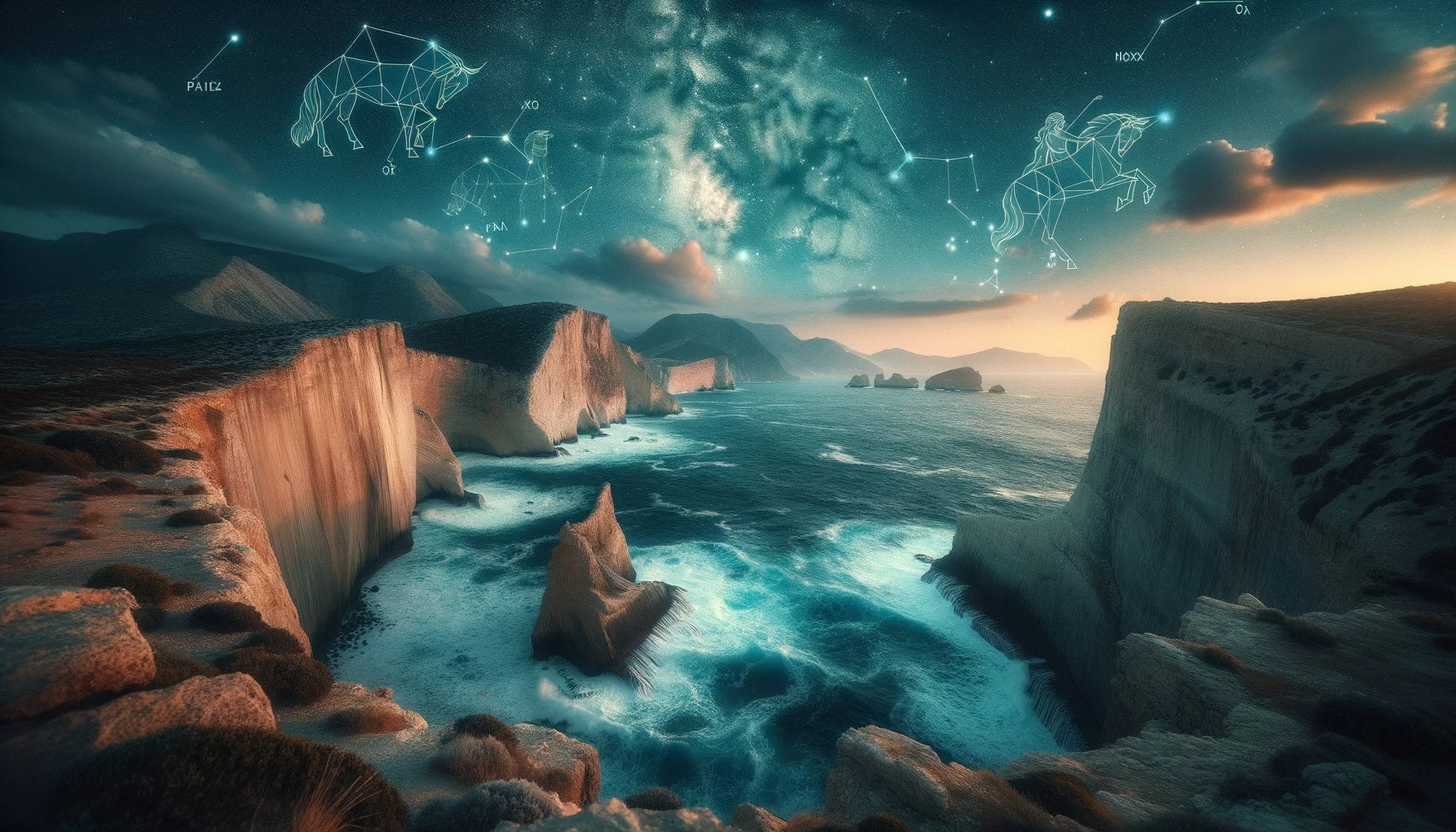
FAQ
Q1: What is Greek mythology?
A1: Greek mythology consists of oral and literary traditions about gods, heroes, and the cosmos. It includes popular gods, goddesses, and mythical stories that have influenced art, literature, and culture throughout history.
Q2: Who are the major gods and goddesses in Greek mythology?
A2: The major gods and goddesses in Greek mythology are the Twelve Olympians, which include Zeus, Poseidon, Hades, Hestia, Hera, Ares, Athena, Apollo, Aphrodite, Hermes, Artemis, and Hephaestus. Zeus is the chief god, while each deity has control over various aspects of life.
Q3: What role do mythological creatures play in Greek mythology?
A3: Greek mythology involves a rich collection of mythological creatures and monsters. These creatures often have unique attributes and abilities. Examples include the Chimera, a fire-breathing creature with the body of a lion, the head of a goat, and a tail with a snake’s head. Polyphemus, a cyclops encountered by Odysseus in Homer’s Odyssey, is another notable creature.
Q4: How has Greek mythology influenced Western literature and culture?
A4: Greek mythology has had a profound impact on Western literature, art, and culture. It continues to inspire various works, from Shakespearean plays to Marvel Comics. Greek-derived mythology has also influenced everyday life, affecting aspects such as names and brands.
Q5: What is the significance of Greek mythology in modern-day Greece?
A5: Greek mythology continues to influence modern-day Greece, weaving its influence throughout the country. It is an integral part of Greek culture, celebrated in festivals, artwork, and archaeological sites.
- Red Cloud, NE: Discover Willa Cather’s Legacy - April 11, 2025
- Remember Old Social Media Sites? Their Rise and Fall - April 11, 2025
- How many days till Feb 3?Accurate Countdowns & Tools - April 11, 2025
